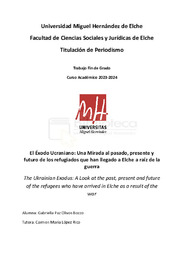Resumen :
"El Éxodo Ucraniano: Una Mirada al pasado, presente y futuro de los refugiados que han
llegado a Elche a raíz de la guerra" aborda la situación de los refugiados ucranianos en Elche
tras dos años de la invasión rusa a Ucrania, destacando su llegada, adaptación y la respuesta
de las comunidades locales.
En la introducción, se contextualiza la crisis humanitaria y se diferencia entre refugiados y
migrantes, subrayando la protección internacional que los primeros requieren. Desde el
inicio de la guerra, 6.5 millones de ucranianos se han refugiado en el extranjero, con más de
500 en Elche. Sin embargo, la atención mediática ha disminuido debido a otros conflictos
como el de Gaza. En Elche, los refugiados reciben apoyo de varias organizaciones locales,
aunque la cobertura mediática ha sido escasa en el último año.
El segundo capítulo explora las asociaciones que ayudan a los refugiados en Elche, como
Somos Ucrania, Conciénciate y Elche Acoge. Estas organizaciones ofrecen clases de español,
asistencia administrativa y apoyo en la integración laboral y educativa. Se destacan los
esfuerzos de estas entidades para facilitar la adaptación de los refugiados, subrayando la
importancia del aprendizaje del español para una mejor integración.
El tercer capítulo presenta testimonios de refugiados como Kyryl, Elena y Alexander, Oksana,
y Olena, quienes comparten sus experiencias de adaptación y las dificultades enfrentadas. A
pesar de los desafíos, han encontrado apoyo en la comunidad local y en organizaciones
como Cáritas y la Cruz Roja. Sin embargo, también señalan la falta de cobertura mediática
sobre la guerra en Ucrania y la necesidad de mayor visibilidad para su situación.
En conclusión, se resalta la importancia de la solidaridad y el apoyo mutuo para enfrentar la
crisis de refugiados, subrayando la necesidad de continuar promoviendo la comprensión y la
cooperación internacional para crear un mundo más justo y seguro para todos.
"The Ukrainian Exodus: A Look at the past, present and future of the refugees who have
arrived in Elche as a result of the war" addresses the situation of Ukrainian refugees in Elche
after two years of the Russian invasion of Ukraine, highlighting their arrival, adaptation and
response of local communities.
In the introduction, the humanitarian crisis is contextualized and a distinction is made
between refugees and migrants, highlighting the international protection that the former
require. Since the start of the war, 6.5 million Ukrainians have taken refuge abroad, with
more than 500 in Elche. However, media attention has decreased due to other conflicts such
as Gaza. In Elche, refugees receive support from several local organizations, although media
coverage has been scarce in the last year.
The second chapter explores the associations that help refugees in Elche, such as Somos
Ukraine, Conciénciate and Elche Acoge. These organizations offer Spanish classes,
administrative assistance, and support in work and educational integration. The efforts of
these entities to facilitate the adaptation of refugees are highlighted, underlining the
importance of learning Spanish for better integration.
The third chapter presents testimonies from refugees such as Kyryl, Elena and Alexander,
Oksana, and Olena, who share their experiences of adaptation and the difficulties faced.
Despite the challenges, they have found support in the local community and organizations
such as Caritas and the Red Cross. However, they also point out the lack of media coverage
of the war in Ukraine and the need for greater visibility for their situation.
In conclusion, the importance of solidarity and mutual support to confront the refugee crisis
is highlighted, underlining the need to continue promoting international understanding and
cooperation to create a more just and secure world for all.
|
 La licencia se describe como: Atribución-NonComercial-NoDerivada 4.0 Internacional.
La licencia se describe como: Atribución-NonComercial-NoDerivada 4.0 Internacional.
.png)
